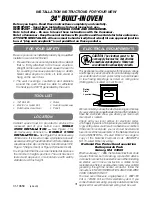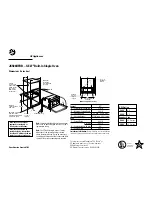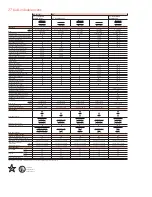
Website:
http://www.sharp.co.uk/support
Help Line:
08705 274277 (office hours)
19
FOOD HANDLING & PREPARATION
ADVICE FOR COOKING
Piercing
Arrangement
Covering
Size & shape
Density &
quantity
Hygiene
Food with skin (such as potatoes, apples, fish,
chicken), or with membrane (such as the white and
yolk of eggs, including boiled eggs), must be pierced
in several places before cooking or reheating. If not,
steam will build up and may cause food to explode.
Note: Eggs in their shells and whole hard boiled
eggs should not be heated in the microwave ovens
since they may explode even after microwaving
has ended.
Place thickest parts of food on the outside of the dish, for
example, the meaty ends of chicken drumsticks should be
placed on the outside of the dish.
Fish, vegetables and certain other foods benefit from being
covered during microwave cookery, follow recommendations
where given and use vented microwave cling film or a
suitable lid.
Food size and shape affect the amount of cooking time
needed. When cooking more than one portion of the same
food ensure they are of a similar size and shape.
Food density and quantity affect the amount of cooking time
needed, for example, potatoes require more cooking than
peas; four potatoes will take longer to cook than two.
Food hygiene standards (storage, handling and preparation)
apply to microwaving. Always store convenience foods as
recommended by the food manufacturer and keep no longer
than the "Use By" date.
WARNING - Always attend the oven when in use.
Carefully follow the SHARP Operation Manual at all times. If you exceed
recommended cooking times and/or use power levels that are too high, food may
overheat, burn, and in extreme circumstances, catch fire and damage the oven.
The microwave power level will default to 100% unless you press the
MICROWAVE
key to reach the desired
setting. Take care when heating foods with high sugar or fat content, for example, Christmas pudding, mince
pies and fruit cakes (see reheating chart in the cookbook section for guidance). Before use, the user should
check that utensils are suitable for use in microwave ovens.
Lids:
Always remove lids from food jars and containers before you use them in the oven. If you do not,
steam and pressure will build up inside and the container may explode.
Do not place hot foods/utensils on a cold turntable, or cold foods/utensils on a hot turntable.
WARNING:
Liquids and other foods must not be heated in sealed containers since they are liable to explode.
R-8740M O/M 5/15/01 12:42 PM Page 19
















































